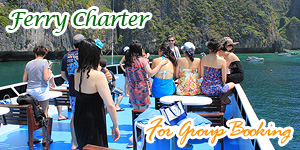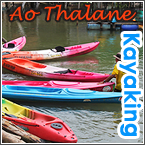Balls of life revive ailing eco-systems
July 4, 2009 by admin
Filed under Living & Lifestyle
Folk wisdom is giving Chumphon residents a novel way to help the environment, and increase the diversity of aquatic life in the rivers and sea
Ancient seafolk wisdom is being used to help restore the richness of Thai marine and river life. Balls the size of a human fist are thought to hold the secret to reviving the damaged eco-systems of both the rivers and the seas. Earlier this month, hundreds of people in Chumphon who live along the Phato River that empties into the sea came together to form the so-called “From Mountains to the Great Waters Network”. The network works on the preservation of the rivers and the sea through emulation of the ancient practice of feeding at the bottom of the food chain. .
In the old days, people would cut tree twigs, submerge them in the river and let them decay. The decayed twigs create humus which becomes food for microbes. Microbes, in turn, become a food source for the plankton in the sea. As plankton are regarded as the starting point of the food chain, the higher their concentration, the bigger contribution they can subsequently make to growth in the population of clams, oysters, sea cucumbers and fish which feed on them.
The twig decaying process, however, is a very time-consuming one.
The network has invented what it calls “probiotic balls” which work equally well in increasing marine life but at a very much quicker pace. The network said the balls were made of organic fertiliser and leaves and leftover food, rice bran, fermented herbal juice, and sea mud. The ingredients are left to ferment and then rolled into balls which are later thrown into the river or sea. During a recent excursion, network members tossed more than 84,000 balls into the Phato River. Most of the balls were buried in the mud around the Ao Thungkasawee mangrove forest, with only a small number near the sea shores. The group has learned a lot from folk wisdom and adapted it, said
Wiwat Salyakamthorn, president of the Natural Agriculture Foundation and a key leader of the network. “The seas in Thailand are dying. If humans are destroying the environment, something must be done before it is too late,” he said. The balls would also add oxygen to the water. The network has observed that after only a month of throwing the balls, stocks of aquatic life had increased around the river mouth and sea. The balls, he added, cost almost nothing to make while there is so much to gain from the sea in return. In addition, the natural breeding pens were made by weaving bamboo cane with coconut leaves into a container where small fish could take shelter. Mr Wiwat said the sea has been hard hit by such human activities as farming, industrial pollution, overfishing, and tourism. Plastic bags and rubbish litter the beaches and the marine creatures’ habitats are badly damaged as a result. The sea is becoming less and less fertile, forcing the fishermen to venture many miles farther out to catch fish these days. He said he had witnessed the failure of some sea conservation projects because they lacked the collective will and effort of the local communities. It would be pointless if the fishermen or seafront communities make an effort to conserve the marine environment only to see the people upstream continue to pollute the river, he said. But Mr Wiwat has not lost hope. “The sea is too vast and the residents here have learned that their one small step could lead to a great leap,” he said. The issue of sea conservation should not be left to the people along the coast to resolve alone. Everyone must work together and cooperate at the community level, only then will we achieve the results we want, he said. “We should apply what we learn from nature to solve our environmental problems,” he said. Restoring the sea with microbial technology was a good example of putting the sufficiency economy philosophy into action, he said. Also, fishermen have been told to stop using destructive fishing techniques while those living along the river were asked to use organic fertilisers in their gardens. Tourists have been urged to stop dumping rubbish into the sea. The network has undertaken many other projects to reverse environmental degradation such as organic farming, setting up tree banks and promoting community-based tourism, which is based on the sufficiency economy principle.
Source :
By: Lamphai Intathep
Bangkok Post
















